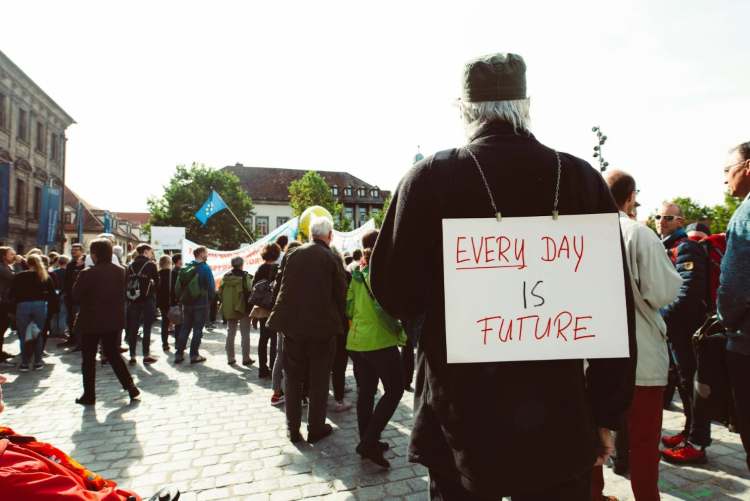
Lack of political will aggravating climate crisis: The summer of 2025 should have been a trumpet-blast for climate ambition: record-cheap solar modules, global clean-energy investment topping $2 trillion, and, for the first time, more electricity in the United States generated from clean sources than from fossil fuels. Instead, it is an elegy for squandered opportunity. From Washington to Westminster, from Ottawa to Canberra, political leaders are surrendering hard-won climate gains to the short-term arithmetic of populism and the cost-of-living crunch. The tragedy is not scientific uncertainty or technological incapacity; it is a failure of political will.
Begin with the United States, where President Trump’s return has produced what one commentator calls a “whole-of-government counter-offensive” against decarbonisation. In just three months, the administration has threatened to reverse the Inflation Reduction Act’s green subsidies, axed tree-planting programmes that were once paraded as climate fig-leaves, and brow-beaten allies into buying more American liquefied natural gas. Conventional modelling suggested a second Trump term would add four billion tonnes of carbon dioxide by 2030; the early evidence hints the tally may be higher. This is not drift—it is demolition.
READ I Wage growth freeze is hurting India growth story
Europe’s retreat behind a wall of bills
Across the Atlantic, the after-shocks of Russia’s war on Ukraine have left Europe clutching at coal and gas. Britain, the first G-7 nation to legislate net zero, is now debating whether legally binding targets are an unaffordable luxury. Labour Party’s flagship promise of clean power by 2030 is whispered about in Westminster corridors as a hostage to future utility bills. In Brussels, meanwhile, elements of the vaunted Green Deal are being quietly watered down to protect heavy industry and household budgets.

The numbers tell their own story. Between 2019 and 2021, governments worldwide adopted more than 300 climate policies annually; last year the figure fell below 50. When the tide of regulation ebbs so sharply, investors notice. The S&P Global Clean Energy Transition Index has lost more than half its value since 2021, and the Glasgow Financial Alliance for Net Zero has haemorrhaged Wall Street signatories. Finance chases momentum; leaders have replaced momentum with mixed signals.
Consider Canada. Mark Carney—the same Mark Carney who rallied financiers in Glasgow with climate crisis warnings—used his first day as prime minister to scrap the federal carbon tax. He argued that families needed relief. They do. But relief without an alternative price on pollution is capitulation. Australia’s Opposition, for its part, promises nuclear plants that experts say will never be built, chiefly to justify keeping coal stations alive for two extra decades. Politics, not physics, is driving the agenda.
Moral thunder, political whimpers
Moral authority is not absent; it is ignored. Pope Francis’s 2015 encyclical, Laudato Si’, helped rally support for the Paris Agreement. Today, right-wing Catholics celebrate his passing in the hope of electing a pontiff silent on climate. Meanwhile, 89% of citizens in a 125-country survey still want tougher action. Ordinary people grasp what elites deny: the past decade is the hottest on record, and climate crisis-related economic damage between 2000 and 2019 already tops $2.86 trillion. If democracy means anything, leaders should amplify that majority, not placate a vocal minority nursing fossil-fuel nostalgia.

Why, then, the backsliding? Three forces converge. First, inflation and higher interest rates have turned every kilowatt-hour into a political grenade. Second, populists have reframed climate policy as an elite hobby that punishes workers—never mind that extreme heat and floods punish the poor first and worst. Third, the fossil-fuel lobby, emboldened by geopolitical turmoil, spends lavishly to ensure any transition is slow enough to monetise the last barrel of oil.
Yet the narrative that green policies drive the cost-of-living crisis is shallow. Renewables produced 92.5% of added global power capacity last year because, in most markets, they are cheaper than new fossil plants. Scrapping subsidies and carbon prices will not cut household bills; it will prolong dependence on volatile gas markets. Leaders are hiding behind short-term utility politics instead of tackling long-term energy poverty.
World leadership and climate crisis
A credible climate crisis mitigation plan must start with honesty. The world is on track for 2.5 – 3 °C of warming. Pretending otherwise insults voters’ intelligence. Leaders should articulate the hard choices and the compensations: targeted income support, not blanket fuel subsidies; investment in mass transit and heat-pump manufacturing, not tax holidays for SUVs; carbon border adjustments that protect jobs while taxing pollution, rather than tariffs that reward petrostates.
Second, governments must restore confidence in the policy pipeline. Stop-start incentives kill investment. A decade-long glide path for carbon pricing, indexed to emissions milestones, would give industry the certainty it craves. So would guarantees that flagship laws such as the Inflation Reduction Act cannot be reversed by executive whim.
Third, finance ministries must crowd-in private capital with de-risking tools—green bonds, first-loss guarantees, and project-preparation facilities. The cost of renewable energy is not the turbine; it is the interest rate. Lower the latter, and poorer nations can leapfrog dirty incumbents.
Fourth, leaders must honour the moral dimension highlighted by Francis. Rich countries promised $100 billion a year in climate finance; they are still short. Delivering that pledge would rebuild trust and undercut populists who weaponise fairness.
In 1940, when the cost of resistance was counted in lives, Churchill declared: “There is no survival for the dullards.” Climate crisis demands similar nerve. The technologies exist, the economics are favourable, and the public is ahead of its leaders. What is missing is political courage—to tax carbon without apology, to redirect subsidies from oil wells to offshore wind, to tell citizens that a liveable planet is worth the price of a heat-pump loan.
World leaders today resemble a relay team that has dropped the baton within sight of the finish line. Future generations will not forgive them for quibbling over the electricity bill while the house burned. It is still possible to pick up the baton. It will require admitting failure, recommitting to science, and, above all, trusting voters with the truth. The alternative is a planet that becomes ungovernable long before it becomes uninhabitable.
